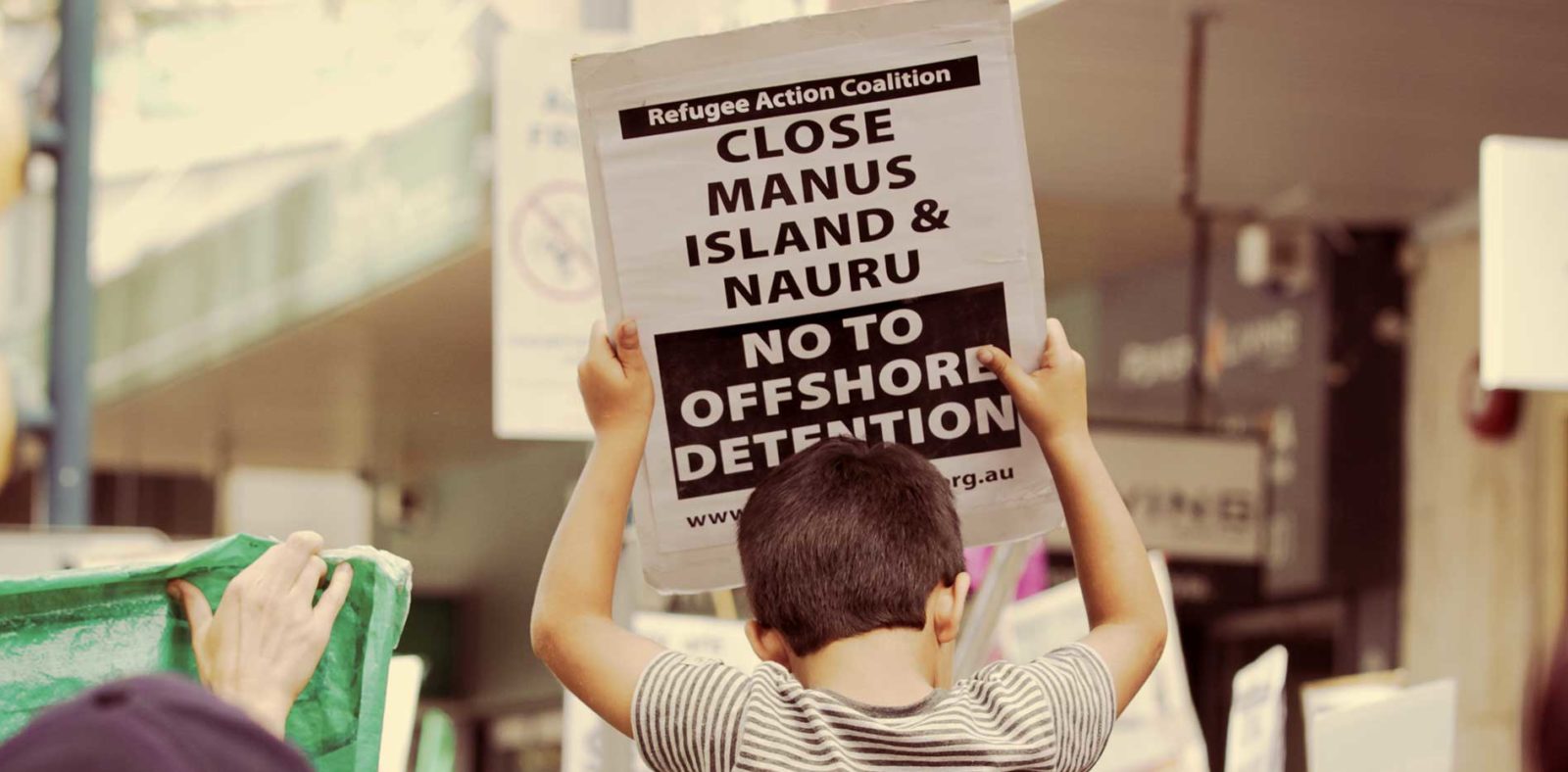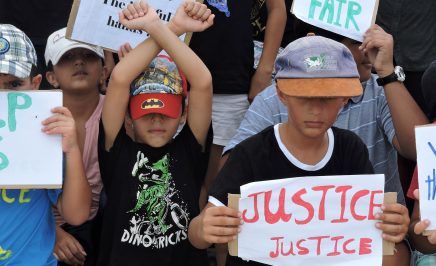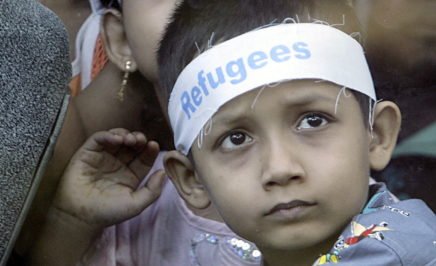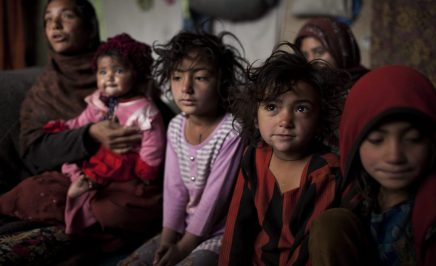The Australian Government is forcing 1,200 men, women and children seeking safety in Australia to live in abhorrent conditions in Nauru.
Despite the wall of secrecy built by the Australian & Nauruan Governments, Human Rights Watch and Amnesty conducted a 12 day investigation in July inside Nauru to uncover the truth behind the treatment of these people searching for protection and freedom.
Dr. Anna Neistat, Senior Director for Research at Amnesty International, who conducted Amnesty’s investigation, revealed that the Australian Government has “designed a system of deliberate abuse” in Nauru, to deter people who are seeking safety that arrive by boat.
“It is essentially like an open-air prison for these refugees & people seeking asylum”.
“I’ve conducted over 60 investigations into human rights abuses in countries like Afghanistan, Syria, Zimbabwe, China but few other countries go to such lengths to deliberately inflict suffering on people searching for safety and freedom. I was not expecting this kind of shocking abuse.”
Anna Neistat
“Australia’s atrocious treatment of the refugees on Nauru over the past three years has taken an enormous toll on their well-being,” said Michael Bochenek, Senior Counsel on Children’s Rights at Human Rights Watch, who conducted the investigation on the island for the organisation.
84 refugees and people seeking asylum were interviewed including twenty-nine women, forty-six men, five girls and four boys. Several personnel from service providers were also interviewed, despite risking prosecution for providing information.
A wall of secrecy
Service providers and others who work on the island face criminal charges under Australia’s Border Force Act if they speak out about what they see.
The Nauru Government has banned Facebook and enacted vaguely worded laws against threats to public order that legal experts fear could be used to criminalise protests by refugees and asylum seekers. Journalists in particular face severe restrictions on entry and UN officials have also been denied entry.
Medical care & mental health
Refugees and people seeking asylum on Nauru – most of whom the Australian government has held there for three years – are routinely neglected and at times denied medical care by IHMS, the main health services company hired by the Australian Government.
Some of its staff have publicly condemned the appalling treatment of refugees on Nauru, raising concerns about the company’s operations there.
Parents were particularly critical of services available to women during pregnancy and childbirth and said that newborns suffered from persistent infections and other medical conditions.
Refugees and asylum seekers suffering psychological trauma and severe mental health conditions do not receive adequate support or treatment.
Refugees and asylum seekers interviewed said that since being transferred to Nauru that many had begun to repeatedly self-harm, cutting their hands or banging their heads against the wall, did not speak to anybody for months, did not recognize their relatives, and stayed in bed for weeks, refusing to go outside or take showers.
“People here don’t have a real life. We are just surviving. We are dead souls in living bodies. We are just husks. We don’t have any hope or motivation.”
A women interviewed on Nauru
Children have begun to wet their beds, suffered from nightmares, and and in some instances had stopped speaking to people outside of their immediate families.
Adults and children spoke openly of having wanted to end their lives.
Amnesty’s Anna Neistat said, “I have never seen such mental anguish amongst people – even in some of the bloodiest conflicts I have not seen this. Words are not enough to convey how bad it really is there.”
Attacks, sexual violence, and impunity
The physical safety of those held on Nauru is a serious concern with every refugee and asylum seeker interviewed reporting intimidation, harassment, or violence directed at them or family members by Nauruans acting alone or in groups. They said the assailants cursed and spat on them, threw bottles and stones, swerved vehicles in their direction as they walked or rode on motorbikes, or broke their windows or destroyed other property.
Every woman interviewed said she could not go out alone.
Six women described sexual assault or harassment, including groping, touching, explicit threats, demands for sex, and attempted rape. Every woman interviewed said she could not go out alone.
Children who attend local schools described frequent bullying and harassment from Nauruan students, who tell them to go back to their home countries. Many have stopped attending classes altogether.
As a result, interviewees said they were afraid to leave their accommodations, particularly at night.
Interviewees said that Nauruan police disregard their complaints and sometimes discourage them from filing reports. Several refugees provided Human Rights Watch and Amnesty International with copies of reports they filed with local police following the attacks, saying that police had done nothing to investigate or apprehend the attackers, even if the victims were able to identify them.
Corporate responsibility for abuse
These businesses are profiting from an abusive context, and based on Amnesty International and Human Rights Watch’s investigations on the island, some are directly responsible for serious abuse and the failure to provide appropriate medical care.
Australia’s operations on Nauru rely on private companies and service providers. These service providers face penalties if they speak out, and some staff members have taken a considerable risk to do so to expose the conditions on the island.
Amnesty International and Human Rights Watch sought comment from the two key companies contracted by the Australian Government to provide services for its Nauru operation, Broadspectrum, the company that runs the Regional Processing Centre, and IHMS, the main medical services provider.
Broadspectrum responded to Amnesty International and Human Rights Watch’s summary of findings that it “firmly rejected” any suggestion that the company did not respect human rights. IHMS stated that its role was to deliver services, and not to engage in Australian Government policy, and “strongly refuted” the allegations put to it by Amnesty International and Human Rights Watch.
Amnesty International and Human Rights Watch believe that these companies’ ongoing involvement in the Australian Government-run centre on Nauru amounts to complicity in violations of the rights of refugees and asylum seekers. These businesses are profiting from an abusive context, and based on Amnesty International and Human Rights Watch’s investigations on the island, some are directly responsible for serious abuse and the failure to provide appropriate medical care.
Australian Government’s abusive and secretive system must end
The Australian Government has violated the rights to be free from torture and other ill-treatment, and from arbitrary detention, as well as other fundamental protections, Human Rights Watch and Amnesty International said.
The Australian Human Rights Commission (AHRC), the Office of the United Nations High Commissioner for Refugees (UNHCR), a Senate Select Committee, and a government-appointed independent expert have each highlighted these abuses, and called on the government to end them.
- Settle all the people assessed to be refugees in Australia.
- Assess all people applying for refugee status in the Australian community.
- Close the Regional Processing Centre on Nauru.
Read the full press release from Amnesty International and Human Rights watch to find out more.




